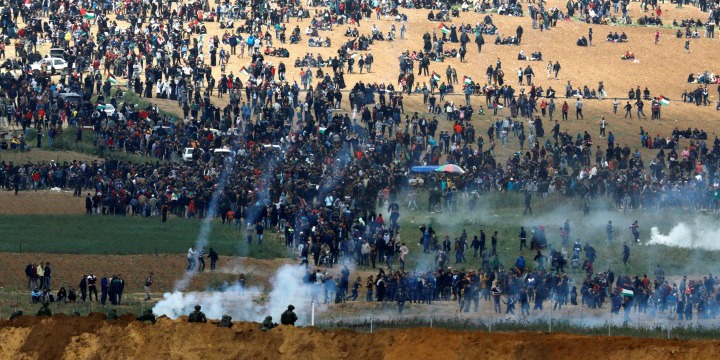For news of the latest attacks, turn to the Israeli media. There we learn that Palestinian Arabs in Gaza launched a wave of helium-filled balloons with flaming Molotov cocktails attached to them in order to fly across the southern border with Israel. Seven of the balloons made it, causing “great damage,” as one Israeli outlet put it.
One of the balloon bombs set off a huge fire in the wheat fields of Kibbutz Mefalsim. The destruction, estimated at “hundreds of thousands of shekels,” was especially extensive because harvest time is fast approaching. That’s a devastating amount for a small kibbutz (total population: approximately 1,000).
Like all secular Israeli kibbutzim, Mefalsim is not exactly a bastion of right-wingers. Nor are they “settlers.” The kibbutz was established in 1949, which is to say, it is situated within the post-1948 armistice lines. Remember when Jewish doves used to claim that the Palestinians are opposed only to “settlers” and not all Israelis? Try telling that to the residents of Kibbutz Mefalsim.
The flaming balloons also set the Be’eri Forest region ablaze. Firefighters and Jewish National Fund foresters risked their lives putting it out.
Israeli Finance Minister Moshe Kahlon visited the area and announced that the government will provide financial compensation to farmers whose fields are being damaged. I’m happy for the farmers, but troubled by the thought that Israeli taxpayers have to pay for damage caused by the Gaza arsonists. Wouldn’t justice be better served if the farmers were compensated with a portion of the various goods on the hundreds of trucks that Israel permits into Gaza each day?
The response of the international community to the kite-and-balloon attacks is also troubling for a number of reasons. The refusal of the news media to take the issue seriously is, of course, appalling. Equally unsettling is the silence of the hypocritical Jewish “peace” groups and misnamed human-rights groups, whose real interest is not peace or human rights, but simply advancing the Palestinian agenda.
Perhaps the most troubling aspect of all this is the way in which Palestinian violence is accepted as a kind of new norm. I’ve written in the past about the way Palestinian Arabs seem to be treated according to what former presidential speechwriter Michael Gerson called “the soft bigotry of low expectations.”
Treating attempts to burn down Israel as unremarkable — as not even worthy of news coverage — is akin to saying that we should expect Palestinians to behave that way. It’s saying that they are inherently incapable of being rational, reasonable, and peaceful.
Imagine the outcry if such a thing was said about any other ethnic, religious, or racial group. And the outcry would be completely justified, of course.
Branding all Palestinians as inherently violent is not only racist, it’s downright dangerous. It attempts to convince the international community that trying to light Israel on fire is perfectly acceptable because “that’s just how they are.” And if that becomes the new conventional wisdom, the excuses for Palestinian violence won’t stop at flaming kites.
Stephen M. Flatow, a vice president of the Religious Zionists of America, is an attorney in New Jersey. He is the father of Alisa Flatow, who was murdered in an Iranian-sponsored Palestinian terrorist attack in 1995.
 Iran Sentences Rapper Toomaj Salehi to Death Over 2022-23 Unrest
Iran Sentences Rapper Toomaj Salehi to Death Over 2022-23 Unrest Netanyahu: ‘Antisemitic Mobs Have Taken Over Leading U.S. Universities’
Netanyahu: ‘Antisemitic Mobs Have Taken Over Leading U.S. Universities’ U.S. Decides Against Sanctions on IDF’s Netzah Yehuda Battalion
U.S. Decides Against Sanctions on IDF’s Netzah Yehuda Battalion Israel Says It Is Poised to Move on Rafah
Israel Says It Is Poised to Move on Rafah Israeli Hostage Hersh Goldberg-Polin Seen Alive in a New Hamas Video
Israeli Hostage Hersh Goldberg-Polin Seen Alive in a New Hamas Video Palestinian Prime Minister Announces New Reform Package
Palestinian Prime Minister Announces New Reform Package France: Man Suspected of Abducting, Raping Jewish Woman ‘to Avenge Palestine’
France: Man Suspected of Abducting, Raping Jewish Woman ‘to Avenge Palestine’ Israel Intensifies Strikes Across Gaza, Orders New Evacuations in North
Israel Intensifies Strikes Across Gaza, Orders New Evacuations in North Iran Threatens to Annihilate Israel Should It Launch a Major Attack
Iran Threatens to Annihilate Israel Should It Launch a Major Attack ‘Completely Baseless’: Reports of Mass Graves at Gaza Hospitals are False, IDF Says
‘Completely Baseless’: Reports of Mass Graves at Gaza Hospitals are False, IDF Says




 Iran Sentences Rapper Toomaj Salehi to Death Over 2022-23 Unrest
Iran Sentences Rapper Toomaj Salehi to Death Over 2022-23 Unrest Israeli Hostage Hersh Goldberg-Polin Seen Alive in a New Hamas Video
Israeli Hostage Hersh Goldberg-Polin Seen Alive in a New Hamas Video Israel Says It Is Poised to Move on Rafah
Israel Says It Is Poised to Move on Rafah U.S. Decides Against Sanctions on IDF’s Netzah Yehuda Battalion
U.S. Decides Against Sanctions on IDF’s Netzah Yehuda Battalion Netanyahu: ‘Antisemitic Mobs Have Taken Over Leading U.S. Universities’
Netanyahu: ‘Antisemitic Mobs Have Taken Over Leading U.S. Universities’